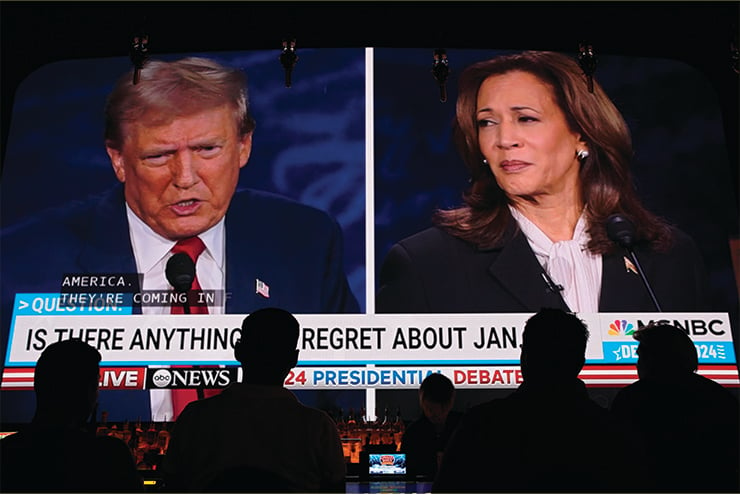September’s presidential debate was anything but presidential. The Cambridge Dictionary defines presidential as “serious, calm, and deserving of respect.” In terms of buildup and spectacle, presidential debates now vie with Wrestlemania. In terms of intellectual rigor, they vie with an English as a Second Language class in a musty church basement.
And, in terms of fairness, they vie with transgender swimmer Lia Thomas’s NCAA championship. After weeks of negotiations, Donald Trump agreed to debate Kamala Harris. He didn’t agree to debate Kamala Harris and ABC News’s David Muir and Linsey Davis.
Thanks to both candidates’ childish antics in previous debates, Americans now get two hours of split-screen pantomimes in lieu of sophisticated argumentation. Viewers feel like Jim Carrey’s bathroom mirror as the candidates try to outdo each other by making exaggerated facial contortions while the other speaks. Indignant sighs take the place of verbal barbs. Painful eye rolls not seen since Linda Blair’s star turn in The Exorcist replace memorable rhetorical flourishes.
If you’re old enough to remember Ronald Reagan’s priceless quip in his debate with Walter Mondale about not holding his competitor’s age against him, then consider yourself lucky. You won’t have to witness many more of these farces. These insulting charades lack all seriousness, beget anything but calm, and deserve none of our respect.
We don’t look to accountants for political guidance. But after September’s Debate-o-mania we should. According to Generally Accepted Accounting Principles (GAAP), a company’s financial statements should reflect the realities of its financial transactions. If that just sounds like common sense, well, it is. Merely complying with the legal requirements is not enough. Instead, the information that appears in a company’s financial statements should never mislead readers, regardless of a transaction’s complexity or the company’s intent to deceive. Every transaction’s economic substance far outweighs the form of its financial statement presentation. Financial statements would amount to nothing more than unreliable marketing brochures if accountants were to scrap this foundational principle. Just like the junk mail marketing brochures clogging your mailbox, September’s debate was all form and no substance.
Take today’s three hot-button issues touched on during the debate: abortion, immigration, and government spending. With the possible exception of slavery, abortion has probably animated more single-issue voters than any other controversy in American history. Anti-life fanatics fear Donald Trump has driven abortion back into the back alleys with his three Supreme Court appointments and the court’s subsequent overturning of Roe v. Wade. Trump’s recent waffling comments in regard to a national abortion ban, in which he walked back his pro-life bona fides, have understandably shaken his supporters.
Now look at the substance of his actions around abortion. Trump has maintained that his goal all along was to put abortion back to the states. Under that rubric, New York can provide free, unlimited abortions right through the ninth month to satisfy its anti-life majority. Conversely, Alabama can outlaw all abortions if that’s what its legislators enact. Trump could have cited No. 45 of the Federalist Papers as his very own political GAAP, if Americans cared enough to demand serious debates.
James Madison wrote Federalist No. 45 to draw a sharp line between the powers delegated to the federal government and those delegated to the states in the proposed constitution. The powers delegated to the federal government would be “few and defined” whereas those delegated to the states would be “numerous and indefinite.” The “few and defined” powers included “war, peace, negotiation, and foreign commerce,” and not, for example, a nationwide drinking age, federal speed limit, or, importantly, regulation of abortion.
Meanwhile, Madison proposed that states would retain the power to regulate “all the objects, which … concern the lives, liberties, and properties of the people; and the internal order, improvement, and prosperity of the State,” which would include, importantly, abortion. Then again, James Madison wrote during a time when substance mattered more than form. Trump tried to explain this during the debate but viewers likely focused on Kamala “Linda Blair” Harris while he did so.
Both candidates spoke out against illegal immigration, sort of. Opposing illegal immigration is like opposing murder. It’s illegal. What is there to oppose? The substantive question around immigration—How many legal immigrants should the United States admit?—will never make its way onto David Muir’s notepad. Someone from the Harris campaign would erase it if it did.
September’s debate focused on the form of illegal immigration, which supposedly includes cat-eating Haitians and Venezuelan banditos taking over apartment complexes. Instead of debating how many Haitians and Venezuelans the United States should admit, if any, we heard about their supposed dietary and criminal proclivities. In substance, Americans want immigrants to enter the country legally—or not at all—just like those same Americans must do at airports when they return from trips overseas.
Oops, they forgot to discuss the national debt. Alas, the debt’s substance will soon crush the dollar’s form.

Leave a Reply